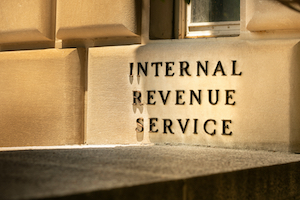The IRS will accept certain requests that an application for a private letter ruling (PLR) be put on the fast track. The announcement came in Revenue Procedure (Rev. Proc.) 2023-26, issued on July 26. 
The acceptance of requests for accelerated processing is a departure from usual procedure: the IRS ordinarily processes requests for letter rulings and determination letters in order of the date received. But Rev. Proc. 2023-26 describes a program that provides an opportunity for fast-track processing of certain PLR requests solely or primarily under the jurisdiction of the Associate Chief Counsel (Corporate). This new program replaces the pilot program established by Rev. Proc. 2022-10.
The change ultimately comes in response to comments requesting faster processing of letter rulings. Because of those comments, the Department of the Treasury and the IRS issued Rev. Proc. 2022-10 on Jan. 14, 2022, announcing an 18-month pilot program to provide an opportunity for fast-track processing of certain PLR requests that were solely or primarily under the jurisdiction of the Associate Chief Counsel (Corporate). The Treasury and the IRS received favorable informal comments from practitioners about that program, and determined that it would be best to adopt the changes contained in Rev. Proc. 2023-26.
Key Changes
Under Rev. Proc. 2023-26:
A taxpayer requesting a letter ruling solely or primarily under the jurisdiction of the Associate Chief Counsel (Corporate) may request fast-track processing. Such a request generally will be granted if the request is solely under the jurisdiction of the Associate Chief Counsel (Corporate), and the requirements described in Section 5 of Rev. Proc. 2023-26 are met.
If the letter ruling request is primarily under the jurisdiction of the Associate Chief Counsel (Corporate) but also includes a request for a ruling on an issue under the jurisdiction of another Associate office, fast-track processing will be granted only if the other Associate office with jurisdiction over the issue agrees to it.
If the letter ruling request is primarily under the jurisdiction of the Associate Chief Counsel (Corporate) but also involves an issue under the jurisdiction of another Associate office, but no ruling concerning that issue is requested, fast-track processing will be granted only if no other Associate office with jurisdiction over the issue objects.
The new program reflects two notable changes to the program set forth in Rev. Proc. 2022-10:
1. Sections 4.02(2) and 5.08(2) of Rev. Proc. 2023-26 provide that fast-track processing will not be granted if the letter ruling includes a closing agreement concerning an issue under the jurisdiction of the Associate Chief Counsel (Corporate) or another Associate office. If the inclusion of a closing agreement arises during the fast-track processing of a letter ruling request, the fast-track processing will be terminated, and the IRS will continue to process the letter ruling request under the procedures of Section 7 of Rev. Proc. 2023-1. Expedited handling under Section 7.02(4) of Rev. Proc. 2023-1 remains available for such requests.
2. Section 5.03(3) of Rev. Proc. 2023-26 clarifies that while a statement providing one or more of the taxpayer’s reasons for requesting fast-track processing is required, the taxpayer does not have to demonstrate a business need unless it is requesting a ruling in less than 12 weeks. The stated reason(s) will be one factor considered in determining whether a request for fast-track processing is granted, and, if so, the length of the specified period defined in Section 4.03 of Rev. Proc. 2023-26.
Published Soon
Rev. Proc. 2023-26 will be published in Internal Revenue Bulletin 2023-33 on Aug. 14, 2023.
Applicability Date
The fast-track ruling program Rev. Proc. 2023-26 establishes applies to all PLR requests described in section 4.01 of the revenue procedure that are postmarked—or, if not mailed, received—by the IRS after July 26, 2023.
Why This Matters
While Rev. Proc. 2023-26 and the acceptance of accelerated processing of PLRs does not refer to retirement plans and those who are involved with them directly, it nonetheless is relevant to them.
Retirement plan providers, professionals, sponsors, and participants and really any party with a stake in a retirement plan can request a PLR. And if one that applies for a PLR qualifies for fast-tack processing, that could result in quicker action by one or more of the parties affected by that PLR—which could affect the plan and participants.
PLRs, of course, are not formal guidance and should not be considered to be precedent. They do, however, provide a look at how the IRS views a particular issue and action that it could take in a more official form that would require compliance.
So whatever the IRS says in a PLR is relevant in that the IRS finds a matter sufficiently important to express its view; it is an alert of sorts that while formal action to which one is beholden has not taken place yet concerning a particular matter, it could do so in the future. PLRs can, at the very least, identify matters meriting the attention of retirement plan professionals and providers and actions they could consider taking in order to stay in compliance with tax law and regulation—and in the process better serve participants.
- Log in to post comments
